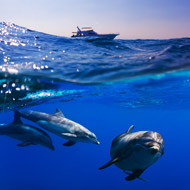
Blubber contains highest concentration of PCBs on the planet
Europe's killer whales and bottlenose dolphins are threatened by marine pollution caused by banned chemicals, according to new research.
The study, published in the journal Scientific Reports, found that the blubber of whales, bottlenose dolphins, and striped dolphins in Europe contains among the highest concentration of polychlorinated biphenyls (PCBs) on the planet.
PCBs are made-made chemicals previously used in the manufacture of electrical equipment, fire retardants and paints. High exposure to the chemical is known to weaken the immune system of cetaceans and markedly reduce breeding success.
Commenting on the study, Dr Paul Jepson, lead author and specialist wildlife veterinary surgeon at ZSL's Institute of Zoology, said: “The long life expectancy and position as apex or top marine predators make species like killer whales and bottlenose dolphins particularly vulnerable to the accumulation of PCBs through marine food webs. Our findings show that, despite the ban and initial decline in environmental contamination, PCBs still persist at dangerously high levels in European cetaceans.
“Few coastal orca populations remain in western European waters. Those that do persist are very small and suffering low or zero rates of reproduction. The risk of extinction therefore appears high for these discrete and highly contaminated populations. Without further measures, these chemicals will continue to suppress populations of orcas and other dolphin species for many decades to come.”
Through their research, the experts were also able to identify locations around Europe as PCB 'hotspots', including the Western Mediterranean Sea and south-west Iberian Peninsular.
Co-author Robin Law added: “Our research underlines the critical need for global policymakers to act quickly and decisively to tackle the lingering toxic legacy of PCBs, before it’s too late for some of our most iconic and important marine predators. We also need to better understand the various pathways through which these iconic species are able to accumulate such high PCB concentrations through their diets.”



 The Veterinary Medicines Directorate (VMD) is inviting applications from veterinary students to attend a one-week extramural studies (EMS) placement in July 2026.
The Veterinary Medicines Directorate (VMD) is inviting applications from veterinary students to attend a one-week extramural studies (EMS) placement in July 2026.